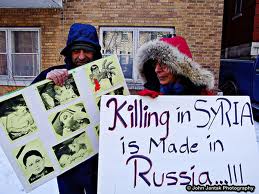 The death toll of Syria’s 13-month civil war has reached more than 11,100 – as the first UN peacekeepers arrive in the war-ravaged country to monitor a “fragile” ceasefire.
The death toll of Syria’s 13-month civil war has reached more than 11,100 – as the first UN peacekeepers arrive in the war-ravaged country to monitor a “fragile” ceasefire.
Doubts have been growing about the truce after government forces attacked rebels in Idlib in the northwest and shelled the city of Homs in a flagrant breach of the deal.
Two civilians died in a car in Hama, and another was shot dead in the town of Inkhel, southern Daraa province, where the uprising erupted in March 2011, according to the Syrian Observatory for Human Rights.
The British-based group said 11,117 people have been killed in the conflict so far – 7,972 civilians and 3,145 military and gunmen, including fewer than 600 rebel fighters.
At least 47 people have died, mostly civilians, since the UN-basked ceasefire came into force on Thursday.
As the first six of a team of 30 international observers arrived in the capital Damascus, UN Secretary General Ban Ki-moon urged “maximum restraint” from Syrian President Bashar al-Assad’s forces and called on the opposition to “fully cooperate”.
Speaking in Brussels, he said: “Just any small, unintended gunfire may break all this very fragile process.”
He said it was the Syrian government’s responsibility to guarantee the monitors access and movement within the country, and he voiced concerns over the shelling of Homs.
“It is important, absolutely important, that the Syrian government should take all the measures to keep this cessation of violence,” he said.
The mission is just one part of the six-point peace plan Syria has agreed with UN-Arab League envoy Kofi Annan, who wants more than 200 observers to be deployed to help resolve the ongoing conflict.
Syrian state media said the observers were welcomed by Syria, which hoped they would see for themselves the “crimes” committed by “armed terrorist groups”.
Meanwhile, Syria’s foreign minister Walid Muallem is set to arrive in Beijing for a two-day visit to brief Chinese officials on the UN-brokered ceasefire.
He had similar discussions with Russian foreign minister Sergei Lavrov in Moscow last week.
Both China and Russia have drawn international criticism for vetoing two UN Security Council resolutions on the Syria crisis.
Their stance has hampered international action on Syria, with both countries opposing Western and Arab calls for Mr Assad, who inherited power from his father nearly 12 years ago, to quit.
Sky News

Leave a Reply
You must be logged in to post a comment.